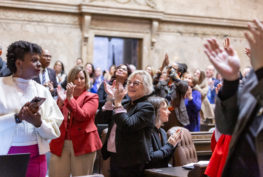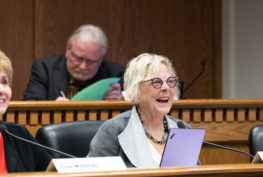Dear friends and neighbors,
I hope you have been soaking up every moment of this wonderful summer. I have had the pleasure of spending the past few months visiting with members of our district, attending community events, and meeting with stakeholders as we prepare for next year’s legislative session.
Much of my work directly correlates to my position as chair of the Senate Human Services Committee, and subsequently, focuses on our state’s corrections system. A few weeks ago, I led members of the committee on a tour to eastern Washington, where we had the opportunity to meet with currently incarcerated people, as well as those working in reentry services.
A primary challenge in this work is ensuring that individuals have what they need, both inside our state institutions and when these leave those facilities. Lowering the risk of recidivism is a primary focus of mine and ensuring a strong network of reentry services is critical to that work. We want those leaving incarceration to be successful, contributing members of society, so it is incredibly important that we work to improve the resources available to them.
Stop 1: Washington State Penitentiary
Our first stop was the state penitentiary in Walla Walla. We spent the day listening and learning from those who work in all corners of the prison, as well as those who are incarcerated there. We discussed everything from facility management to behavioral health treatment, but what was the most astounding to me was everyone’s dedication to successful community reentry.
Corrections officers who work on the Amend Team told us how they safeguard the dignity and well-being of inmates and staff by encouraging more personal interactions. Reentry navigators told us how they are establishing structure for those who are preparing to leave incarceration by connecting them to resources on the outside. Men who have longer stays at the prison showed us their work in the Sustainable Practices Lab — a facility where inmates can learn to sew, weld, woodwork, paint and gain job skills for when they are released.

Teddy bears are made in the Sustainable Practices Lab and are donated to child-serving community organizations.
Stop 2: Blue Mountain Heart to Heart
After visiting the state penitentiary, the Human Services Committee visited Blue Mountain Heart to Heart, a community-based organization focused on serving marginalized communities in rural areas to improve individual and community health.
This visit offered great insight into how harm reduction practices can save lives and lead to recovery. It also stressed how important these services are in rural communities where transitional health care is less accessible.
Stop 3: Tri Cities Reentry Center
The Tri Cities Reentry Center was another great example of the way in which the Amend program can improve the quality of life for incarcerated individuals, as well as Department of Corrections staff.
I had a wonderful conversation with a corrections officer who said after almost 30 years in the department, Amend is empowering connection between staff and incarcerated people in a way he has never seen before.
We spent much of our time learning about what kinds of supports are still needed from the state level to empower successful reentry back into our communities.
Stop 4: Twin Rivers Community Facility
Our last stop was to the Twin Rivers Community Facility in Richland. This juvenile rehabilitation facility provides Dialectical Behavior Therapy to all youth, with an emphasis on individualized treatment and transition.
At Twin Rivers, young people who are incarcerated can work toward their goals, whether that is through schooling or employment opportunities. Staff work with each youth to assist them in achieving those goals and work with them, as well as their families, to support successful transition back into their communities.
I spoke directly with youth about their experience in the facility and their plans and goals for after their time is served.
Our time in eastern Washington was informative, introspective, and inspirational. Though there is still work to do, I left each facility with a resounding feeling that we are working toward positive change in our corrections system.
This trip provided much to think about as we prepare for next year’s legislative session, and I look forward to collaborating with my fellow committee members.
As always, I am honored to be able to do this work and serve the 30th legislative district.
Sincerely,
![]() Sen. Claire Wilson
Sen. Claire Wilson



